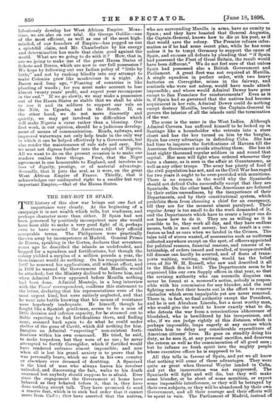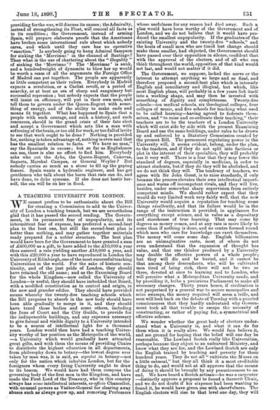THE DRY-ROT IN SPAIN. T HE history of this slow war
brings out one fact of importance very clearly. At the beginning of a campaign it is not wealth which tells, but readiness, and perhaps character more than either. If Spain had not been governed by positively incompetent men she would have been able to make a very good fight of it, perhaps even to have wearied the Americans till they offered acceptable terms. The Philippines were practically thrown away by incompetence at Madrid. General Primo de Rivera, speaking in the Cortes, declares that seventeen years ago he described the islands as undefended, and begged for a squadron and fortifications, but though the colony yielded a surplus of a million pounds a year, the Government would do nothing. On his reappointment in 1897 he renewed his applications, still without effect, and in 1898 he warned the Government that Manilla would be attacked; but the Ministry declined to believe him, and when Admiral Dewey appeared before Manilla nothing had been done. Admiral Montojo, in a long interview with the Times' correspondent, confirms this statement to the letter, declaring that his representations were of the most urgent kind, but were entirely neglected, and that he went into battle knowing that his means of resistance were hopelessly inadequate. He himself, though he fought like a Spanish gentleman, seems to be a man of little decision and inferior capacity, for he steamed out to Subic expecting to find fortifications there, and finding none, steamed back again to do what he could under shelter of the guns of Cavite, which did nothing for him. Imagine an Admiral "expecting" non-existent forti- fications within his own command. He tried, he said, to make torpedoes, but they were of no use ; he never attempted to fortify Corregidor, which if fortified would have rendered entrance almost impossible; and now when all is lost his grand anxiety is to prove that he was personally brave, which no one in his own country or elsewhere ever dreamed of doubting. A Spaniard is the kind of man who always leaves his revolver unloaded, and discovering the fact, walks to his death unarmed lest anybody should suppose he is afraid. Ever since the engagement the Government at home have behaved as they behaved before it, that is, they have done nothing except talk. They have promised to send a reserve fleet, which is in such bad order that it cannot move from Cadiz ; they have asserted that the natives, who are surrounding Manilla in arms, have no enmity to Spain ; and they have boasted that General Augustin, the Captain-General, knows how to die at his post, as if that would save the colony. The Premier refuses infor- mation as if he had some secret plan, while he has none unless it be to tempt Germany to support the cause of Spain, and excuses all defeats by pleading that " if Spain had possessed the Fleet of Great Britain, the result would have been different." We do not feel sure of that unless Spain had possessed also a British Government and Parliament. A great fleet was not required at Manilla. A single squadron in perfect order, with two heavy batteries on Corregidor, mines in the fairway, and sentinels who were not asleep, would have made attack impossible; and where would Admiral Dewey have gone except to San Francisco for reinforcements? Even as it is, if Spain had so governed that the natives had become acquiescent in her rule, Admiral Dewey could do nothing except destroy Manilla, leaving the Captain-General to govern the interior of all the islands until the termination of the war.
The scene is the same in the West Indies. Although Admiral Cervera has suffered himself to be locked up in Santiago like a householder who retreats into a store closet and has the key turned on him by the burglar, Spain has every advantage in defending Cuba. She has had time to improve the fortifications of Havana till the American Government avoids attacking them. She has at least eighty thousand regular soldiers in and round that capital. Her men will fight when ordered whenever they have a chance, as is seen in the affair at Guantanamo, as well as any other troops. The army has plenty of food if the civil population has not, and as the Civil War has raged for two years it ought to be over-provided with munitions. There is no reason in the world why the Spaniards should not defend Cuba successfully except that they. are Spaniards. On the other hand, the Americans are fettered by their entire unreadiness, by the inexperience of their Departments, and by their constitutional system, which prohibits them from choosing a chief for an emergency, till they are for the moment almost paralysed. Their regular Army is too small to do the work demanded. of it, and the Departments which have to create a larger one do not know how to do it. They are as willing as it is possible to be, they work all day, and they have endless means, both in men and money, but the result is a con- fusion as bad as ours when we landed in the Crimea. The tales told of stores wasted, of necessaries such as uniforms collected anywhere except on the spot, of officers appointed for political reasons, financial reasons, and reasons of re- lationship, of orders issued and recalled, of troops crowded till disease can hardly be averted, and of fleets of trans- ports waiting, waiting, waiting, would tax the belief even of Sir W. H. Russell, who saw and described it all in the Black Sea in 1855. The Departments seem to be organised like our own Supply offices in that year, so that the revising authority who can reconcile disputes can never be found at a moment's notice, nobody is respon- sible with his commission for any blunder, and the real fighting men fret their hearts out in the effort to remove obstacles which seem impalpable yet are never removed. There is, in fact, no final authority except the President, and he is not Abraham Lincoln, but a most worthy man, who would give the world to know exactly what to do, who detests the war from a conscientious abhorrence of bloodshed, who is bewildered by his inexperience, and who, if we can judge rightly at this distance, which is perhaps impossible, leaps eagerly at any excuse which enables him to delay any considerable expenditure of American citizens' lives. He goes on steadily doing his duty, as he sees it, at any personal sacrifice, and deserves the esteem as well as the commiseration of all good men ; but he infuses no fresh spirit into the mighty people whose executive officer he is supposed to be.
All this tells in favour of Spain, and yet we all know that nothing will come of these advantages. They were quite as great when General Weyler landed in Cuba, and yet the insurrection was not suppressed. The Spaniards will fight and will die, but they will make some blunder, or be short of some munition, or expect some impossible interference, or they will be betrayed by their own subjects, or they will be abandoned by their own Government, and all their courage and their efforts will be spent in vain. The Parliament of Madrid, instead of providing forthe war, will discuss its causes; the Admiralty, instead of strengthening its Fleet, will conceal all facts as to its condition ; the Government, instead of arming Spain, will prepare elaborate proofs that the Americans have broken some international rule about which nobody cares, and which until they care has no operative 'f sanction." Is anybody going to hang Admiral Sampson for sinking the 'Merrimac' in the channel of Santiago? Then what is the use of chattering about the " illegality " of sinking the Merrimac' ? The ' Merrimac' is sunk, and a hundredweight of dynamite to blow her up would be worth a ream of all the arguments the Foreign Office of Madrid can put together. The people are apparently as little competent as their rulers. Everybody in Madrid expects a revolution, or a Carlist revolt, or a period of anarchy, or at best an era of sharp and sanguinary but successful repression ; but nobody expects that the people will insist on efficiency, will put in their own men, and tell them to govern under the Queen-Regent with some- thing of energy, and of the ability to make ends and means fit together. What has happened to Spain that a people with such courage, and such a history, and such resources, should in the grand crisis of their fate elect and accept a Government which acts like a man with softening of the brain, or too old for work, or too full of levity to see that work ought to be done Nothing is provided for, nothing is taken advantage of, nothing is even said that has the smallest relation to facts. " We have no man," say the Spaniards in excuse ; but so far as Englishmen can see, there is also no effort to find him. Everybody asks who cut the dyke, the Queen-Regent, Canovas, Sagasta, Marshal Campos, or General Weyler ? But nobody carries so much as a, stone to fill up the gaping fissure. Spain wants a hydraulic engineer, and has got gentlemen who talk about the harm that rats can do, and have done, to dyke systems. If she does not bestir her- self, the sea will be on her in flood.



































 Previous page
Previous page